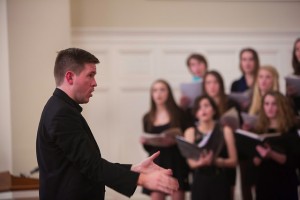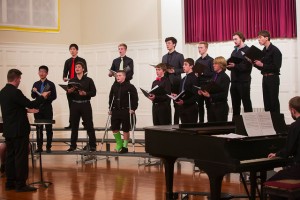
Introducing German choral music to high school students is no easy thing.
In fact, when Joshua Harper wanted the Caterwaulers to sing a piece by Franz Schubert for his first concert with them in 2013, the only edition he could find was overly complex—not a good fit for a male concert chorus.
So he did what came naturally; he edited and engraved a brand new version.
“It’s an accessible Schubert piece and an easy introduction to German,” Mr. Harper said. “This is something that grew out of my work with the Caterwaulers, the first group to sing my edition of it.”
Engraving is a process of “setting” the music through an electronic notation program, Mr. Harper noted. The process can then make the music easier for singers to learn.
“The reason I needed to create a fresh edition is because the current edition is hard to read,” he explained in an email. “So I set the music myself from scratch, cleaning things up, making it a readable edition that we could access immediately.”
In the fall, Mr. Harper submitted his edition of Schubert and five other choral pieces to his mentor, Tony Thornton, director of choral studies at the University of Massachusetts Amherst. Dr. Thornton was preparing a series that would be both distributed by a major choral music publishing company and presented at the American Choral Directors Association (ACDA) national conference.

By winter break, Mr. Harper learned that his a cappella edition of “Die Einsiedelei” would not only be published by Colla Voce LLC, but would also be featured at the ACDA conference to be held in Salt Lake City later this month.
The national conference, which takes place every other year, features what are known as “reading sessions.” During these sessions, hundreds of conductors receive packets of new music and learn it on the spot. The conductors can then bring the music back home to their respective groups and, if they wish, incorporate it into future musical programs and performances.
Mr. Harper said both the publication of the piece, and it’s potential dissemination to between 200-300 conductors at the conference, were great honors. As the high school chair for the Massachusetts chapter of the American Choral Directors Association, Mr. Harper said that one of his goals was to make classical music more accessible to high school students and conductors.
“There are not enough high schools that are performing classical music,” Mr. Harper said. “This is a great step in practicing what I preach in that I’m contributing to the repertoire something that I think will be accessible for other high schools.”
Mr. Harper said he was extremely thankful to have the support of the school community, including professional development funds to pay his way to Utah, and the enthusiasm of his student groups.
“I wouldn’t have done this if it weren’t for Caterwaulers,” he said. “This research came out of wanting to give them that experience.”

